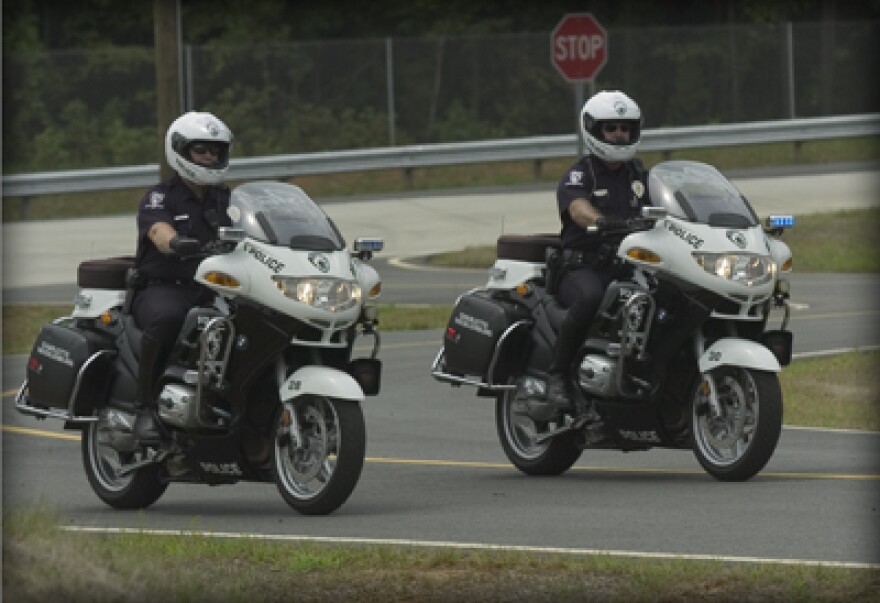Next month the Charlotte-Mecklenburg Police Department will begin equipping every officer with a body camera. The deployment will be completed sometime this fall. Chief Rodney Monroe hopes the cameras will help build public trust in the city’s police force.
Building that trust, however, may depend on how and when the cameras are used. And who has access to the videos they record.
Yesterday, we reported on how body cameras are used on patrol by Greensboro police who have had the camera’s since 2013. In part two of our series, we focus on the issues of privacy, accountability and fears body cameras are just another form of police surveillance.

Here’s one thing that may surprise you about police body cameras, they’re already being used by the Charlotte-Mecklenburg Police. That’s what Major Steven Willis told the Charlotte City Council last month, "Our current body worn camera deployment, in August of 2012 we acquired 16 units for our motorcycle units." How that footage is used, that’s something we can’t verify. Or even question. The CMPD repeatedly declined interview requests for this series. In reference to body cameras, Chief Rodney Monroe told the council they were one of his top priorities. "When you start talking about trust within the community, in order for us to do a whole lot of other things we have to continue to build upon that trust."
And that’s one of the promises of police body cameras, building trust by documenting whenever they interact with the public. But there are potential problems as well.
When you equip an entire police force with body worn cameras, you end up with a lot of footage. "It’s an astronomical amount," says Sergeant Stephanie Mardis. She runs the body camera program for the Greensboro police. "The last time I looked a how much data we’ve used it ranges between 18 – 19 terabytes downloaded so far and counting." For reference, that’s between 18 and 19 million megabytes, of audio and video recorded and stored by the Greensboro PD in just two years.

Greensboro has roughly 500 body cameras, when fully deployed Charlotte will have some 1,400. "Certainly Charlotte is on a scope and scale that is a little bit different than the rest of North Carolina," says Chris Brook, legal director for the North Carolina branch of the ACLU. He adds, "to a lot of the public, when they hear about this, they think of 'ok, now everything that I do when I step out into public is going to be captured by some police surveillance.'" Now before you say well, sure, the guy from the ACLU will be against more cameras in the hands of police, know this, Brook and the ACLU think they have the potential to be a very good thing. Depending on how they’re used.
These recordings are digital, stored in computers. And like all data they have the potential to be mined. And that worries Brook, "So that video needs to be retained by the police for a very limited period of time and used for very limited purposes." And not used to, say, track who attends a political rally.
Charlotte PD plans on keeping their videos for 45 days unless they’re part of a criminal investigation or civilian complaint. Greensboro keeps all of their videos indefinitely. It’s better to be safe than sorry says Sergeant Mardis, "There is no case law right now because, you know, because we are the trailblazers for body worn cameras. So we are creating policies and laws as we speak."
But, perhaps the biggest question about body cameras and the footage they record revolves around just who can view these videos. "There is naturally a lot of heartburn of citizens not being able to access the video," says Mardis. And baring a subpoena, citizens don't get access. Under current North Carolina statutes, video and audio recorded by police are not public records. There are exceptions to those rules but they’re rare. And largely left up to the discretion of the police.
So while Greensboro PD has released body camera footage of a bear in a neighborhood. They’re hands are legally tied on more controversial recordings. And Sergeant Mardis of the Greensboro PD says she understands how that can frustrate the public. "When you have officer involved shootings or a controversial incident that happened, naturally citizens want to be able to view that. But we’re in a position where we have to go by the letter of the law."
One such situation took place on March 25 last year. The first call to 911 was made at 4:29pm.
There’s a little Philippine woman, she’s not right, she’s chasing her mother around with a meat cleaver.
Police arrive five minutes later. Then another call to 911.
Operator: Tell me exactly what happened. Caller: Get in here, I just heard gunshots, get in here. Operator: Yes, ma’am. We have officers on the way.
The woman with the knife was 47 years old, spoke little English and had a history of mental illness. She reportedly charged the officer. She died after being shot multiple times. The entire encounter was captured by a body camera.
Investigations by the city and state both found the officer acted appropriately. The woman’s mother reportedly told investigators, “Don’t blame the officer.”
But the family wants to see the body camera footage. So far the Greensboro police department has denied that request, again citing current North Carolina laws.

And that’s where the promise and problems with police body cameras come into conflict. If the police feel unable – or are unwilling – to release footage to the public, even in cases where officers are deemed to have acted appropriately, what will they do in cases where officers are at fault?
Greensboro PD and the ACLU are working together to craft policies to walk the line between privacy and access. But for those policies to really take hold, the General Assembly to codify them into state law.
As for Charlotte, the police department was granted a special exemption which dates back to 1997 – that’s when dash board cameras were first installed. This is what Major Steven Willis told the city council, "Our current in-car policy allows us, if you allege a complaint against an officer associated with a traffic stop, you have an opportunity to come in and sit down with that supervisor and review that video. We intend to move forward and continue that policy with body camera video."
But that waiver is only for dash cam footage. They’ll have to apply for a new waiver for body cameras. Which again means it’s up to the General Assembly.





